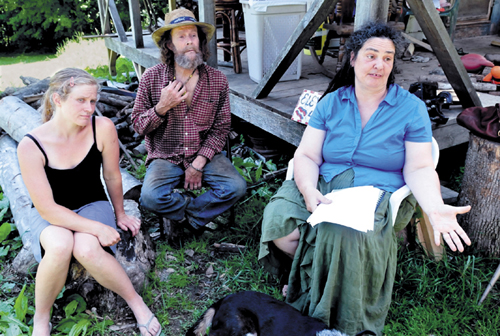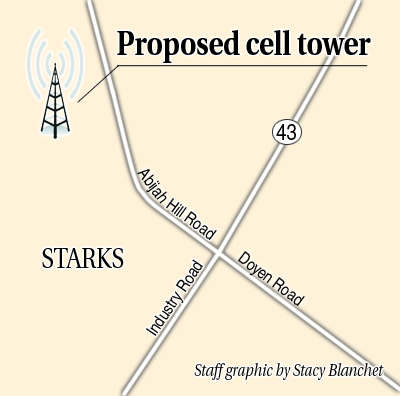STARKS — A woman opposed to the construction of a cellphone tower near her home is facing an assault charge after allegedly spitting into a selectman’s face last month.
Since the tower proposal was first brought to the Planning Board in June, it has been a source of controversy that has divided the town of about 640 people; but it also highlights a larger issue about change in developing rural areas.
Cindy E. Brown, 53, of Starks, was summoned Saturday after she was accused of spitting into the face of First Selectman Paul Frederic on Aug. 21 outside a Planning Board meeting, Deputy Chief Dale Lancaster, of the Somerset County Sheriff’s Department, said Tuesday.
Police have been investigating the incident since sheriff’s deputies responded to a report of a disturbance at the meeting, at which the board approved a building permit application for the tower, Lancaster said.
Brown and her husband, Harry Brown, have opposed construction of the tower, which would be about 700 feet from their home on Abijah Hill Road. Selectmen, meanwhile, have endorsed the tower, saying it would provide better emergency response service, communication and Internet service in town.
As development in rural areas becomes increasingly common, people who are affected by it or who live within sight of it are more likely to be upset, said Tom Doak, executive director of the Small Woodland Owner’s Association of Maine, a nonprofit organization that helps small property owners protect and preserve their land.
Frustration can come from people who live or travel in rural areas with cellphone deadspots and Internet access problems, he said. Other people tend to get frustrated with out-of-state developers proposing projects in their area. Cellphone tower opponents in Starks have spoken out strongly against Massachusetts-based Bay Communications II LLC’s tower proposal.
“I think there’s an inherent kind of friction point between the better cellphone coverage and living in rural Maine and not seeing those kind of structures,” Doak said.
When development — including cellphone towers, wind farms or even new home construction — changes or leads to restrictions on a neighboring property, problems among landowners or even between landowners and town officials are likely, Doak said.
One thing that can help alleviate such conflict is neighbors having conversations about how development might affect other properties, said Doak.
He said he was not surprised about objections to the cell tower, because it can change the visual landscape.
“I don’t think its rural people not wanting to embrace change as much as the fact that it might be less peaceful, quiet or remote after some of those changes take place. People go there to get away from everything, and anything that happens changes that for them. People react to that,” he said.
The alleged assault on First Selectman Paul Frederic is just one incident that shows the range of emotional reactions people have had to the tower, which has drawn protesters outside the Town Office, brought some residents to tears and inspired people to speak out of turn or above each other at public meetings and hearings.
Brown said Tuesday that she had no comment on the assault charge, although she has said previously she doesn’t remember it happening.
According to Frederic, 70, he spent most of the day harvesting hay on his farm, stopped at the meeting to see how it was going and was leaving to go eat dinner about 8 p.m. As he was on his way out, he stopped to talk to a resident, he said, and then Brown spit into his face in the Town Office hallway.
He said she never said why she spit at him; but given discussions they’ve had in the past, he said he thinks the incident was related to the Board of Selectmen’s position on the cellphone tower, which it publicly endorsed in a town newsletter. He called the police, and they arrived at the meeting in about 10 minutes, he said.
He said the meeting that night was disorderly. After the appeals board decision, Elizabeth Smedberg, who is also Harry Brown’s daughter, took a permanent marker and drew a large cellphone tower on a map of the town that was hanging in the Town Office. She said she did not want to comment on her actions, but said that putting a cellphone tower in Starks is something that the town is doing to itself.
Planning Board members, including Chairman Kerry Hebert, have declined to comment on the issue, saying the Browns still might appeal the decision.
Lancaster, the sheriff’s chief deputy, said the town has requested the sheriff’s department’s presence at past meetings to ensure peace.
“It’s clearly a contentious situation going on between the tower and the landowners there,” said Lancaster.
However, that doesn’t mean elected officials or anyone else should be assaulted, said Frederic.
“You don’t have the authority to go around assaulting people or spitting in their face because you disagree on a policy matter,” he said.
The Maine Municipal Association, a resource for local and town governments, does not have recommendations on how municipalities should react if a meeting’s atmosphere is disorderly or uncontrollable because the issues and reactions vary from town to town, association spokesman Eric Conrad said.
However, officials have the right to limit the public’s comments during meetings that are not public hearings, he said. Officials are not required to allow the public a right to speak at a meeting, although it is considered good practice. If that practice is being abused, it does not have to be allowed, Conrad said.
“If a select board or any other board can’t have a meeting without it being disrupted, that’s a problem,” Conrad said.
On rare occasions, he said, police can be brought in not only for the safety of elected officials, but to protect residents and others who may be on different sides of an issue.
Conrad also said many municipal officials in small towns work for little pay.
“They do it because they care about and love their communities, and they certainly know going into it that controversial issues may come up; but they don’t deserve to be assaulted by any stretch of the imagination, whether it is verbal or otherwise,” he said.
Frederic said Starks officials are doing the best they can to resolve the cellphone tower issue.
“It’s too bad, because it is a policy issue and we have to abide by whatever the federal, state and local regulations are relative to this sort of project. I know some people are very unhappy about that, but we can’t change federal law or state law and we can’t change a municipal ordinance on short notice in the middle of a project review,” he said.
The application will be approved formally when the Planning Board approves the minutes at its meeting next week. The Browns and Elizabeth Smedberg have said they plan to appeal the decision, and they have 30 days from the approval to do so.
Frederic said he attended the last Planning Board meeting as a citizen and, although he left the meeting early, found it to be a hard environment for the board and others to work in.
“They’ve had to put up with a lot,” Frederic said.
The meeting lasted nearly four hours, partly because of frequent interruptions by the Browns’ lawyer, Barbara Chassie, who interjected objections after almost every motion the board made.
She was asked many times to refrain from interrupting, as time constraints could not allow the board to hear unlimited public input. Hebert eventually told her that the police would have to be called if she did not stop speaking over the board.
The issue has been complicated further by the history that the Browns have in town.
For the last 24 years, they have hosted three annual pro-marijuana festivals that many Stasrks residents oppose. The Browns have defended their position by arguing that they have the right to use their land as they want.
Both Frederic and the Browns have said the two issues — the cellphone tower and marijuana festivals — have become muddled in some people’s minds. They say the history of the marijuana festivals may have contributed to some residents finding an opportunity to oppose the Browns during a vote on a proposed telecommunications moratorium.
The proposal, which was rejected by a vote of 86–41, was preceded by an opportunity for public comment, which included a statement from Claire Nelson, who along with her husband Mark, is leasing property to Bay Communications.
“For 25 years the Browns have fought strong community opposition to the festivals, maintaining their right to use their land in a manner they see fit; but now that another landowner seeks to exercise those same rights, it is somehow a violation of sanctity and way of life,” Nelson said to an applauding audience.
Other residents have said the festivals have earned the town a reputation for being a drug-infested place where no one would want to move or send their children to school.
Smedberg said her family thinks there has been prejudice throughout the cellphone tower debate because of the marijuana festivals they have helped organize.
“It seems like anyone who is against the tower is for the festival, and it’s this battle between the festival and the cellphone tower,” she said.
Selectmen have endorsed the cellphone tower, but Frederic said they have kept feelings on the marijuana festivals separate.
“Those feelings should not impact how one views the cellphone tower issue. This could have been any citizen’s property,” he said.
He said there will be a clear answer eventually about whether the cellphone tower will be built, although it has been difficult to get there.
In the meantime, Frederic said selectmen will discuss the possibility of filing charges against Smedberg for defacing the town map. He said they are concerned less about the monetary value of the map than about people’s behavior in public gatherings.
“There is a public safety issue here. If one person can be assaulted, others can. If one piece of property can be damaged or defaced, others are at risk. Individuals that are at meetings or in the area are at risk. It’s larger than a single incident,” Frederic said.
Rachel Ohm — 612-2368
rohm@mainetoday.com
Send questions/comments to the editors.





Success. Please wait for the page to reload. If the page does not reload within 5 seconds, please refresh the page.
Enter your email and password to access comments.
Hi, to comment on stories you must . This profile is in addition to your subscription and website login.
Already have a commenting profile? .
Invalid username/password.
Please check your email to confirm and complete your registration.
Only subscribers are eligible to post comments. Please subscribe or login first for digital access. Here’s why.
Use the form below to reset your password. When you've submitted your account email, we will send an email with a reset code.